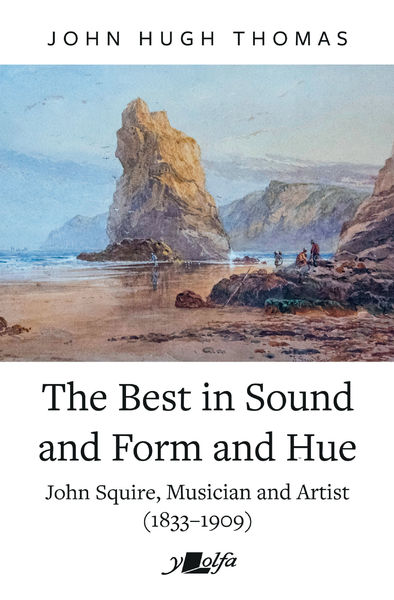Life and legacy of influential Victorian musician and artist explored
This week sees the publication of a fascinating work of social history based on extensive primary-source research by the author, John Hugh Thomas. The Best in Sound and Form and Hue – John Squire, Musician and Artist (1833 – 1909) is the biography of a banker and skilled landscape painter, but more importantly a musician who had great influence on musical life in the West of England and South Wales. John Hugh Thomas’ biography places the life and career of John Squire in its broader cultural and social context within Victorian Britain.
John Squire was an excellent violinist and conductor, and an artist of national stature. He was born in Cornwall into a banking family which encouraged an active interest in education and the arts. As a bank employee throughout his professional life, his career took him to several towns and cities in his native Cornwall as well as Bristol, Ross-on-Wye, Hereford, Kingsbridge in Devon and Exeter, before he arrived in Swansea, in 1883.
Author John Hugh Thomas said:
“The driving forces which most influenced the creation of this biography were serendipity and my natural curiosity. The first ‘happy and unexpected discovery’ happened at the age of fifteen or so, when I found a copy of a concert programme dated April 1890 when a performance of Handel’s ‘Acis and Galatea’ had been given at Swansea’s Albert Hall. Thirty years of more passed before I started studying the programme in detail. The stimulus for this was the invitation to write a chapter on Music in Swansea in the Nineteenth Century, for the book Abertawe a’r Cylch edited by Ieuan M. Williams, published in 1982. Research for my contribution to the book began with the concert programme already mentioned and took me to the Royal Institution of South Wales where I would find a complete run of the Cambrian newspaper. And that’s when my interest in John Squire began!”.
The book is founded on an extensive investigation of primary sources, particularly contemporary newspapers. The author’s research took him to the Colindale Newspaper Library in London as well as to places associated with John Squire to try and discover as many of his paintings as possible. Squire was a skilled painter, especially of landscapes in Wales and his native Cornwall, and his work was exhibited at the Royal Academy; this secondary aspect of his cultural life is also explored in the biography.
“I was keen to try and discover some of Squire’s paintings, and it was during one of my visits to London that serendipity worked its magic again. Quite by chance I came across a rather dark, Dickensian looking establishment which specialised in picture framing. Peering into the gloomy interior, I was drawn by two indistinguishable paintings hanging on the back wall. I asked if I might have a closer look and discovered, to my amazement, that they were watercolours by John Squire. Furthermore, they proved to be the two earliest paintings og his to have been exhibited in public. So well received had they been that John Squire was awarded a silver prize at the exhibition of the Royal Cornwall Polytechnic Society. Discoveries of this kind greatly appealed to my sense of discovery. Detective fiction has long been an enthusiasm of mine: Sherlock Holmes and Maigret were my constant companions for many years. The search for evidence of John Squire’s achievements still keep my interest and enthusiasm alive,” said John Hugh Thomas.
John Squire retired from the bank in 1895 and left Swansea for London. He also seems to have abandoned public music-making and painting around the same time. His impact and lasting legacy were huge. Some of those whom he had taught in Swansea progressed to enjoy national, and even international acclaim, while others were leading lights in the expansion of chamber music and the emerging Early Music movement. Another consequence of this itinerant biography is that the volume reveals details about networks of musicians, amateur and profession, across South Wales and the West Country. It also links Squire’s endless energetic activity and the work of institutions such as the Royal College of Music and the Eisteddfod. Also, three of his children went on to have brilliant music careers, having won scholarships to the RCM and RAM and progressed to establish themselves as major performers in London and the provinces.
“This was the time when the British Isles, or more particularly England, perhaps, had the unfortunate reputation of being known as das Land ohne Musik. Yet the life of John Squire shows that nothing could have been further from the truth,” said John Hugh Thomas. “Hopefully the book will shed a clear light on the significance of capable and committed amateur musicians of the calibre of John Squire and his gifted pianist wife, Emma, for whom high technical standards and teaching, and integrity in performance were paramount.”
The text will be accompanied by 20 illustrations, some black and white and others in full colour, and including many of Squire’s acclaimed paintings.
